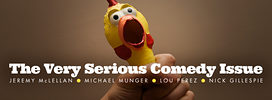In my lead essay, I argue that comedy celebrates the incongruity between reality and our attempts to understand or control it. Pointing that out or recreating it makes people laugh. Nick Gillespie’s argument is that much of comedy does no such thing, but rather soothes and makes the audience feel good about what they already believe.
This would be a profound response if I had not addressed this in my essay. In fact, much of my piece was spent warning comedians and other artists against the temptation to do just that. I think the problem is that Nick seems to think everything comedians do is comedy. I’m not sure why he thinks this. Comedians engage in virtue signaling, relay stories and facts, and we have moral, religious and political views. But those things aren’t the funny part. Those things may get you applause, but they do not make people laugh. The funny part comes later when we make the joke, when we (hopefully) are saying something unexpected or, as Nick calls it, “recognizing the limits of human knowledge.” Which is why I think, regardless of the comedian’s other activities, comedy is inherently anti-authoritarian. That’s the stuff that makes people laugh.
Nick’s big example this time is Prairie Home Companion. I grew up listening to Prairie Home Companion with my family, and we loved it. We also thought it was funny. It spoke to us. Sure there’s lots of stuff in the show that is annoying or unfunny or designed to soothe you, but if you hear people in the audience laughing at something, it’s because they thought it was funny. If you don’t think it’s funny, then perhaps you have a different set of expectations and it doesn’t work on you. Or maybe Nick has refined tastes and only the highest caliber of comedy suits him, which is why he feels led to virtue-signal that to his readers. But the temptation to consider “art that doesn’t work on me” as necessarily “art that is bad” is, ahem, a form of moralizing.
Of course if no one laughs, but you keep succeeding because you make the audience feel good, then you aren’t doing comedy, you’re doing the comedic equivalent of kitsch, which I define in my essay as “inoffensive art produced to soothe an audience and render it undisturbed and unsurprised.” Maybe Nick thinks PHC is mostly kitsch, but in order to get laughs, it still has to be funny. It’s the same with comedians who aren’t that funny but are good at promotion or networking. I hear amateur comics respond to that by saying “comedy is just promotion and networking now,” which reminds me of Nick saying it’s all virtue signaling. But my response is the same: Actually, at the end of the day, you still have to be funny. The funny stuff is comedy.
(If Nick has a video example of a soothing joke that doesn’t subvert audience expectations or point out any kind of incongruity but still gets a huge laugh from the audience, I’d love to see it. Let’s get specific.)
Which brings me to St. Genesius. He engaged in moralizing and virtue signaling to gain favor with the emperor. However, I’m sure his sketch was funny, which is why it also made people laugh. Otherwise they would have clapped or cheered. And yes, I have always found it hilarious that the patron saint of comedy is someone who is venerated for the one time he stopped doing comedy. But that’s Catholicism for you.
TLDR: Comedy is inherently subversive, but not everything comedians do is comedy. Nick is mad at the other stuff comedians do.

